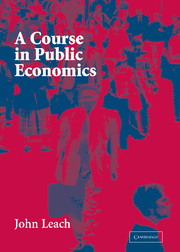Book contents
- Frontmatter
- Contents
- List of Figures
- Preface
- 1 Introduction
- Markets
- Externalities
- Public Goods
- Imperfect Competition
- Taxation and Efficiency
- 16 Taxation
- 17 The Welfare Cost of Tax Interactions
- 18 The Theory of the Second Best
- Asymmetric Information and Efficiency
- Asymmetric Information and Income Redistribution
- A Note on Maximization
- References
- Index
16 - Taxation
from Taxation and Efficiency
Published online by Cambridge University Press: 06 July 2010
- Frontmatter
- Contents
- List of Figures
- Preface
- 1 Introduction
- Markets
- Externalities
- Public Goods
- Imperfect Competition
- Taxation and Efficiency
- 16 Taxation
- 17 The Welfare Cost of Tax Interactions
- 18 The Theory of the Second Best
- Asymmetric Information and Efficiency
- Asymmetric Information and Income Redistribution
- A Note on Maximization
- References
- Index
Summary
The things that people do to avoid paying taxes alter the allocation of resources in ways that reduce economic welfare. To see this, compare the following situations:
1) On the morning of the first of January, you discover that $100 that you had in your pockets is no longer there. You do not know whether it was lost or stolen or spent in the previous night's revelry; all that you know is that you will have $100 less to spend in the coming year than you had expected. You decide that you can trim a little from your budget: it's no big deal.
2) On the morning of the first of January, the government bids you a happy new year and announces that it is imposing a 20% tax on movie tickets. You have been in the habit of spending $750 each year on tickets, so this tax will cost you $150 over the year if you do not change your habits. However, movie-going has suddenly become a relatively expensive pastime, so you decide that you will go to the movies only ⅔ as often as you had in the past. The tickets will cost you $500 and the tax on these tickets will cost you $100, so you will have an additional $150 to spend on other items.
- Type
- Chapter
- Information
- A Course in Public Economics , pp. 241 - 255Publisher: Cambridge University PressPrint publication year: 2003



